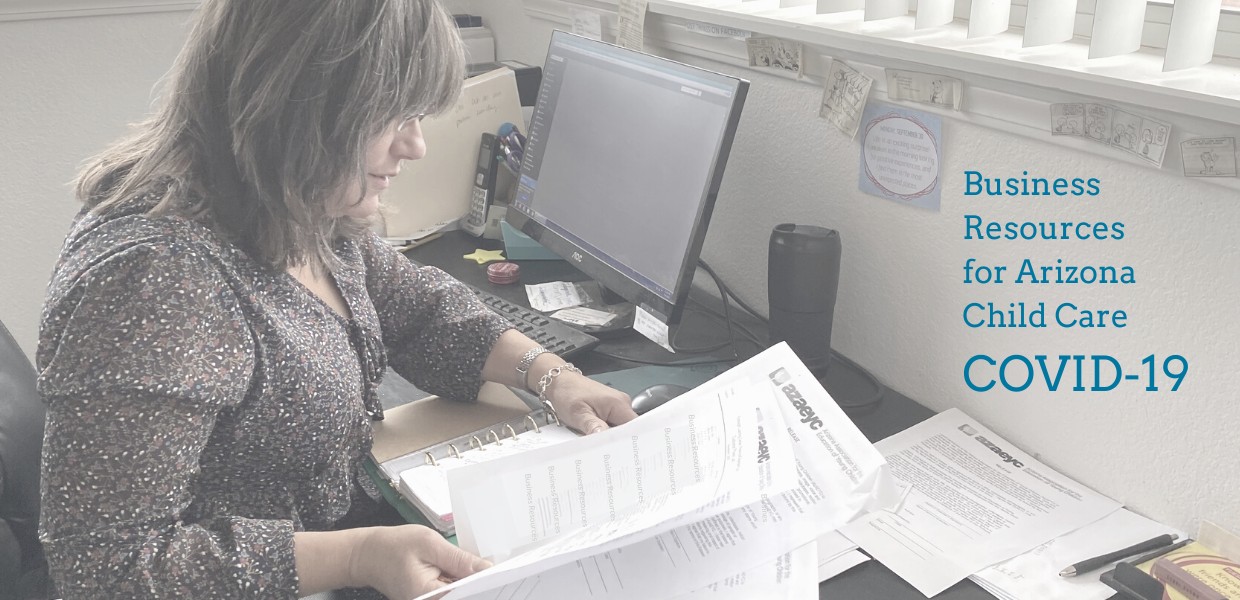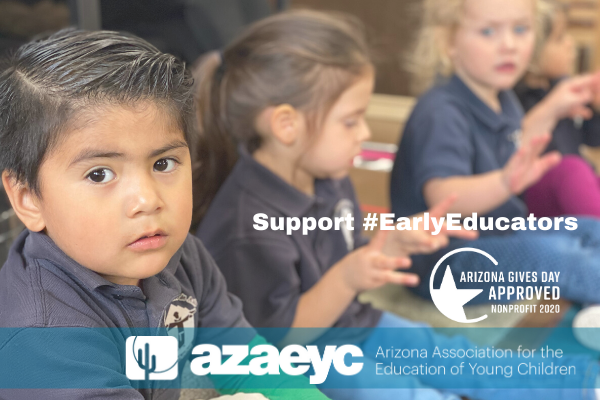UPDATED June 15, 2020
Easy access to business resources for Arizona child care providers is critical during the COVID-19 pandemic. What are the options for small business loans? Where are updates on unemployment insurance? How can Arizona child care providers efficiently access critical information — all in one place?
Through our collective advocacy efforts, AzAEYC and SAZAEYC leaders have gathered the following business resources for Arizona child care providers. We will continue to update this list as we work tirelessly for all ECE professionals in our state.
Find even more business resources for Arizona child care in AZToolkit. AzAEYC is offering a complimentary AZToolkit subscription to ALL of Arizona’s child care providers through May 31, 2020 — to access more than 1,800 nationally vetted shared services resources for business, finances and purchasing, health and safety, curriculum, polices, and training. Email ebucher@azaeyc.org for additional details or to sign up for complimentary access to AZToolkit through May 31.
Project ECHO: PD
In partnership with Arizona State University College of Health Solutions and other community partners, AzAEYC is excited to announce the launch of the first Arizona Early Childhood ECHO (Extending Community Health Outcomes) professional development sessions.
Child Care Business
State Funding Supports
Become an Arizona Enrichment Center – Licensed child care centers and family child care providers may be eligible to become an Arizona Enrichment Center and receive public monies to provide priority access and care to children of first responders, critical healthcare workers, and essential public sector employees. Providers do not need to be DES contracted. Find eligibility information and apply at the Arizona Enrichment Center website.
Small Business Loans
The U.S. Small Business Administration approved an Economic Injury Disaster Loan declaration for Arizona that will help small businesses impacted by COVID-19. The loans may be used to pay fixed debts, payroll, accounts payable and other bills that can’t be paid because of COVID-19’s impact. Find out more about interest rates, eligibility, and how to apply here.
What Child Care Programs Need to Know about…
The Paycheck Protection Program: English | Spanish
The Economic Injury Disaster Loan Program: English | Spanish
Paying Yourself, Your Staff, and Your Bills: English webinar and slides
Cómo pagarse a sí mismo, a su personal y sus deudas: Spanish webinar and slides
How to Apply for a SBA Disaster Relief Loan
Arizona DES Offers Support for DES-Contracted Child Care Providers during COVID-19 – AZDES
Unemployment Insurance
Governor Ducey expanded unemployment access to individuals whose employment was affected by COVID-19. Find more information at the DES Unemployment website.
The U.S. Small Business Administration approved an Economic Injury Disaster Loan declaration for Arizona that will help small businesses impacted by COVID-19. The loans may be used to pay fixed debts, payroll, accounts payable and other bills that can’t be paid because of COVID-19’s impact. Find out more about interest rates, eligibility, and how to apply here.
AZToolkit
We’re keeping AZToolkit up-to-date with important, accurate guidance directly from trusted organizations like the CDC as well as financial tools and business resources for Arizona child care providers and programs to help plan and respond to COVID-19.
Arizona COVID-19 Survey
Child Care Resource & Referral – ARIZONA continues to collect information from registered, licensed providers that will be used to assess the current supply of child care and determine business resources, needs, and demands statewide. Access the Survey here.
AzAEYC and SAZAEYC continually monitor trusted sources for updated information to guide our response to COVID-19 as an ECE field. Find additional information – all in one place – from the CDC, Arizona Department of Health Services, NAEYC, and more at www.azaeyc.org/toolkit.
We will keep fighting for early childhood support and investments as the scope of the crisis and the effect on child care continues to become increasingly clear to policymakers and the public.



